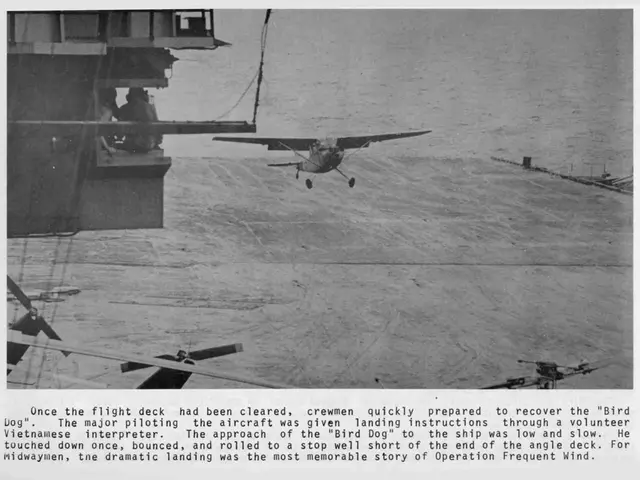"CMA CGM Leads the Way in Ensuring Compatibility of Blockchain for Electronic Bill of Lading Adaption"
The logistics and shipping industry is embracing a digital future, as outdated, paper-based documentation systems are increasingly recognised as inadequate for modern global trade. In this shift, the CMA CGM Group, a leading player in the maritime logistics sector, is taking a significant step forward.
The French shipping giant has entered into a Memorandum of Understanding (MoU) with a consortium of digital trade and technology enablers, including CargoX, eTEU, ICE, SGTraDex, and Singapore's Infocomm Media Development Authority (IMDA). This alliance aims to achieve full interoperability of electronic bills of lading (eBL) by 2030.
The ultimate goal is to facilitate faster and more efficient global shipping documentation processes through the seamless, secure exchange and recognition of eBLs across different digital trade platforms worldwide. This interoperability initiative aims to reduce fraud risk, speed up cargo release, and improve supply chain transparency and sustainability.
The primary objectives of the collaboration are centered around three key pillars: the technical, legal, and commercial viability of eBL interoperability, the development of pilot projects, and alignment with globally accepted legal and technological standards.
One of the key elements of this initiative is the adoption of TradeTrust by key players like IMDA. This endorsement is seen as a strong indication of TradeTrust's capability to support cross-platform interoperability in electronic trade documentation.
A joint working group will be established by the consortium to lead technical evaluations and oversee trial phases for eBL interoperability. IMDA is optimistic about facilitating the trials and promoting widespread industry adoption of TradeTrust.
The CMA CGM Group's digitalization strategy is part of its broader efforts to advance next-generation trade facilitation tools. The Group's leadership believes that working closely with trusted partners and incorporating blockchain-based infrastructure will accelerate the shift towards a fully digital container trade environment.
By adopting TradeTrust, CMA CGM positions itself at the forefront of the digital trade revolution. The Group aims to transition all of its original bills of lading to electronic format by the year 2030. This move towards blockchain-powered interoperability strengthens its leadership position in advancing next-generation trade facilitation tools.
The initiative reinforces the Group's ambition to contribute to a more secure, resilient, and environmentally sustainable trade ecosystem. The consortium plans to develop and execute pilot projects to test and validate the proposed interoperability model. Singapore's Infocomm Media Development Authority (IMDA) has expressed support for the CMA CGM's initiative to adopt TradeTrust for electronic trade documentation.
In conclusion, the CMA CGM Group's strategic alliance with digital trade partners is a significant step towards achieving a paperless, streamlined shipping documentation process by the end of the decade. This initiative aligns with the industry's shift towards digital trade documentation to meet the demands of modern global trade, fostering global digital trade standards and connectivity.
Read also:
- Industrial robots in China are being installed at a faster rate than in both the United States and the European Union, as the global market for these robots faces a downturn.
- Hyundai N affirms transition to hybrid performance-centric models, initiating with Tucson N
- Stock markets in India anticipated a moderate opening, influenced by mixed signals from global markets.
- Tesla's Model Y ride-sharing service halts operations in New York City








